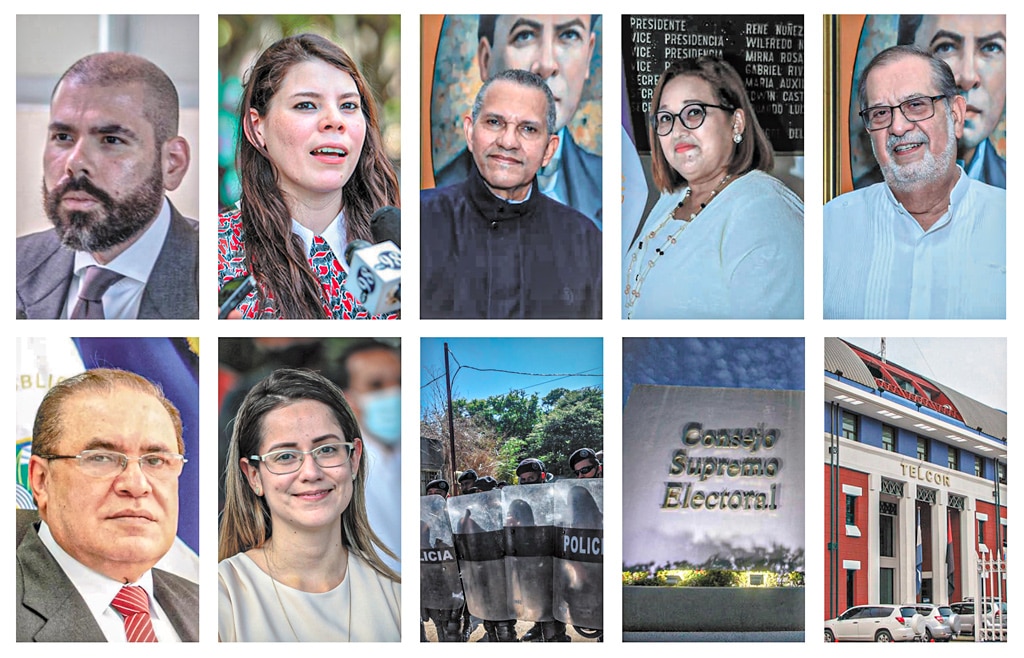The Government of Switzerland joined this January 24 to the sanctions adopted by the European Union, on the 10th of the same month, against members of the Government of Daniel Ortega whom he considers responsible for the deterioration of the human rights situation, the rule of law and democracy in Nicaragua.
Those sanctioned are six members of the entourage of President Daniel Ortega, who have all the assets they may have in the Swiss financial system frozen and are prohibited from entering or transiting through Switzerland.
On January 10, the European Union (EU) sanctioned seven high-ranking officials of the Nicaraguan regime, including two sons of the presidential couple —Laureano and Camila Ortega Murillo—; Luis Ángel Montenegro, Superintendent of Banks; Nahima Janett Díaz Flores, director of Telcor; and three magistrates of the Electoral Power, Lumberto Ignacio Campbell Hooker, Brenda Isabel Rocha Chacón and Cairo Amador Arrieta, the latter president and vice president of the CSE. In addition, it sanctioned three institutions: the National Police, the Supreme Electoral Council (CSE) and the Nicaraguan Institute of Telecommunications and Post Office (Telcor).
The Swiss Federal Department of Economic Affairs indicated that its sanctions apply to two personal advisers to the Nicaraguan president and four high-ranking representatives of the Judiciary and the Police who are accused of human rights violations.
The financial entities that could have a relationship with those sanctioned must declare it to the Swiss authorities.
Switzerland clarified that punitive measures are not applied under any circumstances to the population of Nicaragua.
“The Government calls on the Nicaraguan authorities to respect and defend human rights inscribed in domestic law and international public law, in particular freedom of expression and assembly,” the Federal Department said in a statement.
He also assured that “in consideration of the forty years of commitment to the development of Nicaragua, Switzerland is ready to support efforts aimed at finding a peaceful solution to the socio-political conflict” in the Central American country.
The sanctions of the European Union and the USA on January 10
The Council of the EU, which brings together the Member States, indicated on January 10, in a statement, that those sanctioned “are responsible for serious human rights violations, including the repression of civil society, support for presidential elections and fraudulent parliamentarians, and the undermining of democracy and the rule of law” in Nicaragua.
The sanctions were announced hours before Daniel Ortega and Rosario Murillo assume a new term as president and vice president of Nicaragua, respectively.
The same day, the United States Department of the Treasury also sanctioned six operators of the regime, among them Nahima Janett Díaz Flores, punished by the EU and daughter of the director of the National Police, Senior Commissioner Francisco Díaz, who has already been sanctioned by the European Union and the United States.
According to the US government, the sanctions were established in conjunction with the EU. These were imposed against three charges of the Nicaraguan military apparatus; two directives from Telcor, and another from the Nicaraguan Mining Company (Eniminas).
The sanctions affect the Defense Minister, Rosa Adelina Barahona; Brigadier General Bayardo de Jesús Pulido Ortiz, who occupies the third highest rank in the country’s military system, and the Chief of Staff of the Nicaraguan Army, Bayardo Ramón Rodríguez Ruiz.
From Telcor, in addition to Díaz Flores, Celina Delgado Castellón, deputy general director, was sanctioned. Both are singled out for “disinformation and persecution of independent media.”
Ramón Humberto Calderón Vindell, a retired Army general and president of the board of directors of Eniminas, was also sanctioned to hit the benefits generated by state control of gold mining, given that the value of exports of that metal in Nicaragua has “Growed drastically in recent years.”
The sanctions of the Office of Foreign Assets Control (OFAC) of the Department of the Treasury imply the blocking of all the properties or assets that these persons may have in the United States or under the control of Americans, and prohibits them from any transaction with citizens who are in that country.

















